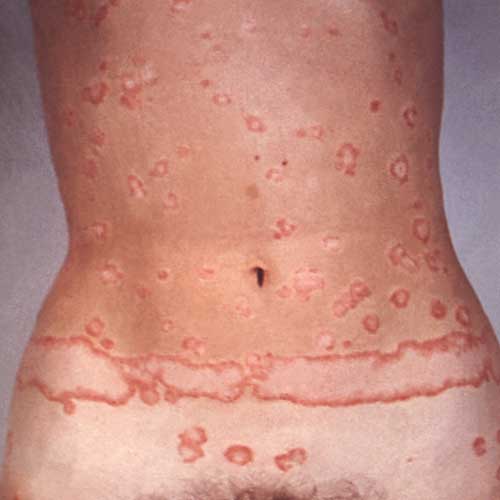Symptoms of psoriasis are usually easy for a qualified physician to see and diagnose, although there are occasionally cases where the patient will need to be referred to a specialist for further evaluation. It can be harder to quantify which type of psoriasis the individual is suffering from, but even this can be overcome relatively easily by concentrating on the part of the skin which is afflicted.

The symptoms can be controlled in a variety of ways, but this is more likely to happen successfully if the subject has a controlled lifestyle and is not doing anything which can aggravate the condition. The psoriasis symptoms are caused by a malfunctioning of the immune system. Exactly why this happens remains unknown, but it does happen and it happens in situations where there has been no prior difficulty. This is even more puzzling than the phenomenon of food allergies, where at least it is a foreign substance to which the body is objecting. With psoriasis, it is the human skin itself which is somehow perceived to be a problem. This does not make the treatment of the condition easy, and indeed there is no known way to cure the disease completely.
The symptoms will be prone to flaring up at any time, which is why sufferers will need to be able to carry creams and lotions with then constantly. These will be able to bring immediate relief, and allow you to carry on with your normal daily routine. If the attacks happen frequently, then you will definitely want to take advantage of both the external and the internal treatments which are on offer. Before you do this, it is important to get an accurate diagnosis carried out, and most psoriasis treatments need to be prescribed by a physician in any case.
When the symptoms of psoriasis are first observed, the primary need will be to evaluate the exact nature of the condition. There are fundamental differences between the guttate psoriasis which affects young people temporarily, and the plaque psoriasis which accounts for four out of every five cases. The guttate psoriasis can go either way as it is treated. It can either disappear completely, or it can worsen and turn into plaque psoriasis. Once you know which type of condition you are dealing with, you can begin to formulate your treatment. This treatment should start with simple lifestyle management.
Start your treatment program by working out how to avoid all of the major risk factors which can trigger an attack. This may demand a complete change in your lifestyle, or it may mean very little change, depending on how you already live. If you are physically active, you will need to take special care not to get in to situations where your skin can be damaged. A damaged skin is the most important risk factor to avoid, as it can trigger severe attacks. Many of the other risk factors are just the same common sense ones you would want to avoid in any case, such as smoking and excessive drinking.
Living a balanced lifestyle will do more for this type of illness than anything else. As well as eliminating the obvious threats to health, try to avoid excess fat and sugar as they also put a strain on the immune system. Use a lot of raw food in your diet, especially raw fruit which is rich in vitamins. Don’t allow your skin to stay too long in the sun, especially in extremely hot weather, but do allow it some exposure to the air. Use vitamin preparations on the surface of the skin to reduce symptoms.
If you have improved your lifestyle habits to the fullest possible extent, and still the symptoms of psoriasis remain, you are going to need treatment from your physician. The first treatments will usually be vitamin based, but if the condition does not improve drugs will need to be used. There are still options which can be tried before steroids need to be brought into play, and these are less likely to produce extreme side effects. The drug Methotrexate, for example, is taken only once a week, but it has the ability to reduce symptoms in less than two months.
If these mild drugs cannot relieve the symptoms of psoriasis, you will need to be prepared to either use steroids or another type of treatment. Steroids are highly effective, but if they are used for too long a period they can backfire and leave you with a more serious condition than when you started. Ultraviolet treatments are also hazardous, but they can have immediate effect. The future looks brighter, as it is to be hoped that biologic drugs will soon become standard. These work by targeting the immune system far more accurately and specifically, so are a safer way to combat symptoms of psoriasis.











